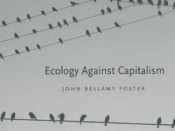“Capitalism and Degrowth: An Impossibility Theorem“, Monthly Review, vol. 62, no. 8 (January 2011), pp.26-33. DOI: 10.14452/MR-062-08-2011-01_2
Almost four decades after the Club of Rome raised the issue of “the limits to growth,” the economic growth idol of modern society is once again facing a formidable challenge. What is known as “degrowth economics,” associated with the work of Serge Latouche in particular, emerged as a major European intellectual movement in 2008 with the historic conference in Paris on “Economic De-Growth for Ecological Sustainability and Social Equity,” and has since inspired a revival of radical Green thought, as epitomized by the 2010 “Degrowth Declaration” in Barcelona.… Ironically, the meteoric rise of degrowth (décroissance in French) as a concept has coincided over the last three years with the reappearance of economic crisis and stagnation on a scale not seen since the 1930s. The degrowth concept therefore forces us to confront the questions: Is degrowth feasible in a capitalist grow-or-die society—and if not, what does this say about the transition to a new society?
Reprints:
- An earlier, slightly different version of this article was published in the December/January 2011 issue of Red Pepper (UK).
- The MR version was reprinted in Synthesis/Regeneration 55 (Spring 2010), pp. 35-39.
Translations:
- Italian translation by Andrea Grillo at Senza Soste.it, December 27, 2010.
- German translation in Luxemburg 1 (2011), pp. 12-17.
- Catalan translation, Kit de Supervivéncia Ambiental, March 16, 2011.
- Greek translation in the Forum of ARENA, February 2, 2011.
- Portuguese translation by Paula Sequeiros for Esquerda.net, December 4, 2010.

